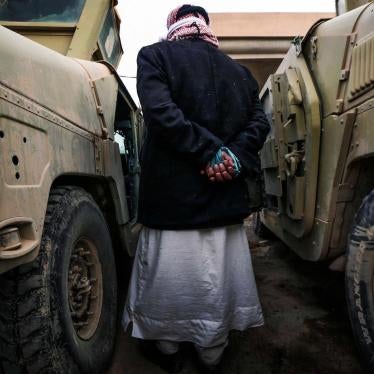Last week's shutdown of Sanaa's airport by security forces seeking to reverse President Abed Rabbo Mansour al-Hadi's dismissal of top brass loyal to the ancien regime exemplified exactly where Yemen is stuck.
After three decades under former President Ali Abdullah Saleh, elements within the transitional civilian government are eager to move forward, with ambitious plans to reform the country's legal and security infrastructure. But they lack the muscle to rein in the security forces, implicated in many of the worst human rights abuses during last year's uprising yet still operating their fiefdoms. Restoring law and order requires a major restructuring of those security forces and a strong dose of accountability for the killings of hundreds of peaceful protesters and indiscriminate attacks on civilian areas.
The blighted record of Yemen's security forces is well documented. The Central Security Forces, headed by Saleh's nephew, Yahya Saleh, stood by while armed pro-government thugs attacked and killed 45 demonstrators on March 18, 2011. The Republican Guards, headed by Saleh's son, Ahmed Ali Saleh, indiscriminately shelled residential neighborhoods in Taiz last year, killing dozens of civilians. There is little contention that these security forces participated in or failed to prevent several similar attacks. Yet when I visited Yemen in late March, the country's general prosecutor could not confirm that a single senior officer in either of these forces had been questioned, much less prosecuted.
In the name of "moving forward," the Gulf Cooperation Council (GCC) and the United States worked out a deal offering Saleh a blanket amnesty and all his aides immunity from prosecution for "political crimes" in exchange for Saleh's agreement to leave office – immunity that Yemen's Parliament enshrined in law this year. The GCC deal included a provision for a draft Transitional Justice Law that would establish a truth commission, leaving open the hope that Yemenis will at least be able to establish a record of the gross abuses carried out by political and military leaders and compensate people who suffered at their hands. But the current draft doesn't give the commission subpoena powers, so even this small remedial measure will prove limited.
Sanaa, Yemen's capital, remains a city divided, with neighborhoods under the control of various warlords, and none under President Hadi's control. The Republican Guard refuses to fully remove its troops and checkpoints because, its commanders argue, the renegade First Armored Division and militias of the powerful al-Ahmar family won't pull theirs back.
While Hadi and Interior Minister Qader Qahtan have made clear their plans to bring the security services under civilian control and remove officials implicated in abuses, it's also clear they are currently powerless to do so. Yahya Saleh's appearance at my meeting with Qahtan was a surprise, and effectively preempted any discussion of the interior minister's relationship with Central Security.
Despite this standoff, the U.S. government has pledged to resume counterterrorism assistance to fight Yemen's thriving al Qaeda branch, most likely to some of these same military units, to the tune of $75 million this year. If the United States is serious about supporting democratic transition and the rule of law in Yemen, it needs to enforce counterterrorism czar John Brennan's promise that no aid will go to units involved in "political shenanigans" such as the airport shutdown. The United States should start with rigorous Leahy Law-style vetting of all security units being considered for funding. It also should help ensure that those units are accountable to Yemen's civilian government, and that the government conducts serious investigations into their abuses.
The international community should also lend technical and financial support to the legal affairs ministry, which has set itself the ambitious task of rewriting the country's major laws to make them comply with international human rights standards, including laws on nongovernmental organizations (NGOs), labor rights, political parties, and the media.
Minister Ahmed al-Mikhlafi, a former human rights activist, recognizes that this is an opportunity to lay a legal foundation that will protect rights for generations to come. Mikhlafi's offices, unlike the plush, expansive offices of the National Security Agency and Republican Guard, are in a small, dilapidated building. He works with a skeletal staff, sometimes without electricity – as we discovered during our meeting in the dark. The United States also can support the new human rights minister, Huriyeh Mashour, who has boldly challenged security force abuses, but bemoaned the lack of skills, training, and funding for her underpaid staff.
The United States, the European Union, and the Gulf states were key to persuading Saleh to leave office. Now, they should make an equally concerted effort to help Yemen's new government build rights-respecting security institutions and establish the rule of law. Without these elements, al Qaeda is likely to flourish and rival security factions won't accept civilian rule. Donor countries need to ensure that their assistance moves Yemen forward, and doesn't reward elements holding it back.
*Sarah Leah Whitson is Middle East and North Africa director at Human Rights Watch.*






